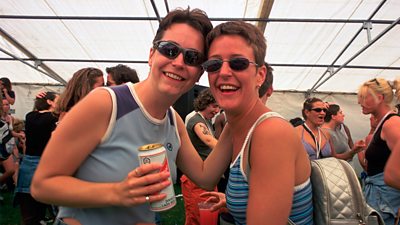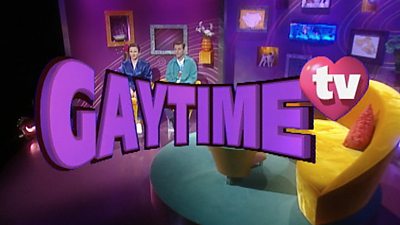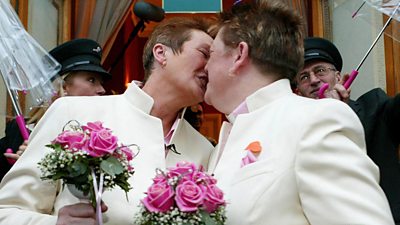Two Strictly professionals Graziano Di Prima and Johannes Radebe danced to Emeli Sande’s song, Shine, in the show's first ever same-sex dance, November 2019.
The UK’s LGBTQ+ community rarely got a mention on air in the early years of the ����ý – hostility and prejudice was rife. Today LGBTQ+ lives are featured on ����ý programmes like any other community, and to mark UK Pride Month 2020, ����ý History traces how the broadcaster has understood its LGBTQ+ audience over the years - from absolute invisibility on pre-war TV to a celebration of LGBTQ+ lives on Gaytime TV in 90s - it’s a fascinating journey.
-

LGBTQ+ and the ����ý
The first known discussion of LGBTQ+ issues on the ����ý was in 1955. This marked the start of the ����ý’s understanding of its LGBTQ+ audience as ����ý History discovers. -
 The Daily Mail celebrated the arrival of the ����ý’s first dedicated programme for the LGBTQ+ community in 1995, saying it had a ‘lightness of touch that other minority interest magazines would do well to emulate’. Through new interviews for the ����ý Oral History Collection, our history of Gaytime TV explores what became a sea change in LGBTQ+ programming.
The Daily Mail celebrated the arrival of the ����ý’s first dedicated programme for the LGBTQ+ community in 1995, saying it had a ‘lightness of touch that other minority interest magazines would do well to emulate’. Through new interviews for the ����ý Oral History Collection, our history of Gaytime TV explores what became a sea change in LGBTQ+ programming. -

Share your Memories
What ����ý LGBT+ programmes do you remember over the years? What programmes supported or acknowledged you as a member of the LGBT+ community? If you don't identify LGBT+ tell us how you feel about ����ý LGBT+ programmes. -

The ����ý LGBTQ+ Timeline
From rumours about the sexuality of the ����ý’s first Director General, to the first same sex Strictly competitors, our timeline explores LGBTQ+ life at the ����ý from the 1920s to the present day.
Our LGBTQ+ pages contain excerpts and programmes from ����ý services at various moments in history. The archive material should be viewed in this context and with the understanding that some of the content reflects the attitudes and standards of its own era – not those of today. Please note that some footage contains language which is now clearly outdated but which was regarded as acceptable by many people when first used. If you are affected by any of the issues raised in the history of the ����ý LGBTQ+ content, you can get advice and information here.
